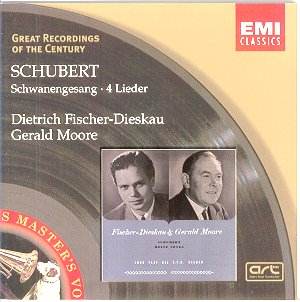SCHUBERT
Schwanengesang/4 Lieder
 Dietrich Fischer-Dieskau
(baritone)/ Gerald Moore (piano)
Dietrich Fischer-Dieskau
(baritone)/ Gerald Moore (piano)
Recorded 1951/52/55/58
 EMI Great recordings of
the Century CDM5 67558 2 0 [65.06]
EMI Great recordings of
the Century CDM5 67558 2 0 [65.06]
Crotchet
Amazon UK Amazon US

Keeping up with the BBC Joneses and their Legends series now seems to other
companies to be the priority of the day. EMI have recently extended the plunder
of their priceless vaults with a further ten discs among which is this splendid
Schubert compilation originally made in four sessions over a seven-year span.
The partnership of Fischer-Dieskau with Gerald Moore, our premier accompanist
of the latter half of the twentieth century needs little introduction. This
represents the best artistry of both men. Their sensitivity to the words
and the way Schubert sets them brings forth every nuance of phrasing, dynamic
shading, pacing of tempo, and immaculate detail. This is a hard task to bring
off, for Schwanengesang, unlike Winterreise or Die Schöne
Müllerin is not a song cycle but a collection of songs. It dates
from the last year of Schubert's life, 1828, hence the title Swansong
invented by their publisher Tobias Haslinger when they appeared posthumously
a year later. Of the twenty or so versions currently in the catalogue, and
despite competition from the likes of Hotter, Souzay, Prey and Haefliger
in the past, Fischer-Dieskau remains supreme, with the peak being his darkly
operatic singing of Heine's Der Atlas. The group of four Heine settings
were recorded during the singer's early period, in 1951 when the baritone
was just 26. Indeed it is precisely the sheer variety of tone colour he produces
over the fourteen songs which will hold the listener spellbound, the words
so coloured with mood and emotion that a translation appears irrelevant.
Coupled with this is the artistry of Moore, who, to quote two of the titles
of his autobiographical books is both an unashamed accompanist and never
too loud. Though Moore himself wrote of Fischer-Dieskau, 'he had only to
sing one phrase before I knew I was in the presence of a master', the singer
might well have written the same, with the substitution of the word 'play'
for 'sing', of his accompanist. It is indeed a great recording of the last
century.
Christopher Fifield

